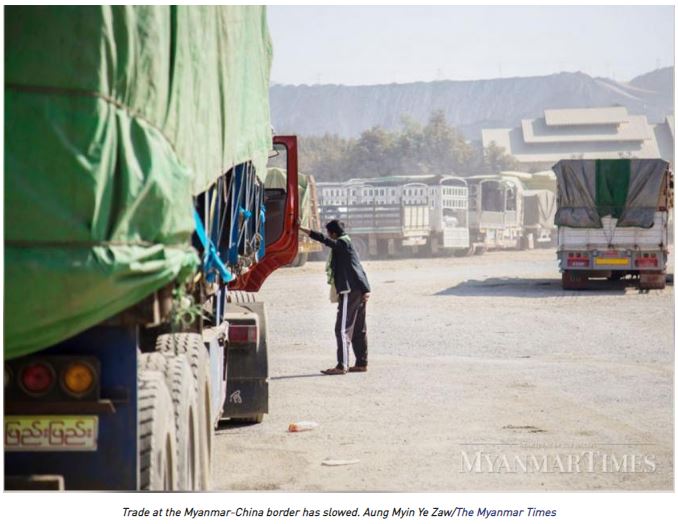Myanmar: Kyin San Kyawt gate temporarily reopens
Kyin San Kyawt gate at the Myanmar-China border has been temporarily reopened with effect from January 10, U Khin Maung Lwin, assistant secretary from Ministry of Commerce, told The Myanmar Times.
“It is temporarily open for the fruit season,” he said. Details of the official plan have yet to be confirmed. Kyin San Kyawt gate is a border trade gate since 2015, but is not recognised officially.
After negotiations among the defence and foreign affairs ministries and the Chinese embassy on January 7, an official letter about current difficulties was sent to the the government took this initiative as temporary measures. To make it an official gate, various ministries will be involved, he added.
As the information wasn’t received in advance and they received late about the reopening date of the gate and also as trade is closed at 108 Fruit Wholesale Center, watermelon and muskmelons trucks will not be able to export from Kyin San Kyawt Gate on that day, so they will only be able to export starting from January 11, said U Sai Khin Maung, the chair of Muse Fruit Wholesale Centre.
The gate was closed since December 27, and the closure has caused severe disruption in the export of fruits, according to Muse Fruit Wholesale Centre. Although only 1,000 trucks are currently allowed to pass once every three day on Kyu Kote-Pan Sai Road, 300 trucks are entering and waiting at the Wholesale Centre every day.
More broadly, Myanmar must take steps to negotiate bilateral trade agreements with its neighbours to avoid volatility in border trade with China to avoid losses and uncertainty.
“There is currently no precise policy for border trade. Every country should have a policy to deal with trade disagreements and volatility. Right now, Myanmar is on the losing end with little power to deal with trade issues,” Dr Maung Maung Lay, vice chair of the Union of Myanmar Federal Chamber of Commerce and Industry, told The Myanmar Times earlier this month.
Border trade with China accounts for about 70 percent of all trade between Myanmar and its neighbours. It also involves high volumes of Myanmar agricultural produce. Almost all Myanmar maize is exported to China, for example. Yet, there are no existing policies or bilateral agreement dealing with trade disruptions or disagreements between the two countries.
As a result, border trade through the Muse checkpoint declined by US$562 million in the October-December period, according to data from the Ministry of Commerce.
The drop in trade has been attributed to China’s trade suspension and tight confiscation policy at the border, along with the closure of the Kyin San Kyawt gate.
Source: https://www.mmtimes.com/news/kyin-san-kyawt-gate-temporarily-reopens.html


 English
English




